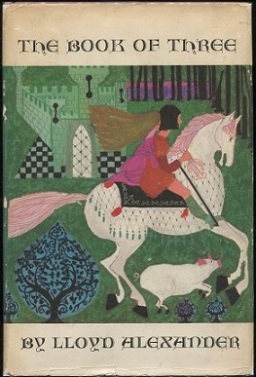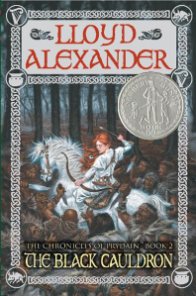Some books are good the way pizza is good, offering a nice (or shocking or spicy) experience that pleases the senses.
Some books are good the way a narrator is good, displaying a high level of skill that appeals to the intelligent mind.
And some books are good the way Scripture is good, portraying a quality of morality—faceted with truth, beauty, and goodness—that nourishes the soul.
Many books are the first kind of good. Many books are also the second kind of good. But few books are the third kind of good, let alone all three. Those books are to be valued as the rare treasure they are, starting with The Lord of the Rings and The Chronicles of Narnia. Another fantasy series that I would place on the same high shelf as these well-known paragons is The Chronicles of Prydain by Lloyd Alexander.

I had just finished listening to The Chronicles of Narnia, a delightful experience that not only transported me back to my childhood when I listened to the same audiobooks but also served as a balm for my aching soul during some rocky times. My spirit was buoyed and my heart was blessed by these books, and I wanted to continue my listening with another story that would similarly mingle old memories with new appreciation.
While The Chronicles of Prydain had been on my to-reread list for well over a year, they were not a high priority for rereading and, at the time, weren’t available on the audio apps I use. A book or two away from the end of Narnia, however, I updated my Libby library and discovered—to my endless cheer—that The Chronicles of Prydain audiobooks were indeed available.
As soon as I finished Narnia, I began The Book of Three. Even more so than with Narnia (which I had reread only two years ago), I could not contain my delight as I reentered the world I hadn’t fully visited since elementary or middle school. I had vague recollections from some stories, but many details had been forgotten and were rediscovered with surprise and pleasure. (Imagine being introduced to a character at the beginning of the book and you can’t help thinking, with sorrow, “I remember you. You’re going to die.” And then there was the moment while I was making lunch in my kitchen that I went “Oooooooh” aloud as soon as I heard the name Magg.)
As the author relates in his introduction to The Book of Three, he drew heavily from Welsh stories that do in fact feature Arawn the Death Lord, Hen Wen the oracular pig, Arawn’s black cauldron, and Prince Gwydion. The rest, Alexander admits, he filled in himself. (While these books are more commonly marketed as YA, they’re appropriate and accessible to a mature middle-grade reader as well.)

Let me count some of the reasons why I love these books, and you would love them too:
1. The wit
Alexander writes both his prose and his characters with a delightful, dry, and clean wit. I was laughing within the first few pages, and I later told my mom, “I didn’t remember these books were so funny!” Whether from Eilonwy’s innocent quips, Dallben’s aged sarcasm, or the narration’s own dry humor, these stories will at least put a smile on your face, if not make you laugh out loud.
2. The creativity
Along with a writing style that is both simple and beautiful (as seen in Chapter 2 of The Book of Three: “The woods here were not thick, but shadows drenched the high tree trunks and the sun broke through only in jagged streaks. A damp green scent filled the air.”), Alexander demonstrates enviable creativity in the unique personality and speech patterns he gives to each character.
- The creature Gurgi sprinkles the pages with rhyming phrases such as “crunchings and munchings,” “whackings and smackings,” “seeking and peekings,” “spyings and pryings,” and so on.
- The princess Eilonwy offers a unique perspective with her regular comparisons, expressing (often with some strong emotion) that something is “like putting caterpillars in somebody’s hair,” “like having your head put in a sack,” “worse than somebody coming up and eating your dinner before you have a chance to sit down,” and “like counting stones in a wall”—and that’s just the start.
- If Eilonwy personifies simile, the bard Ffleddur Fflam personifies the exclamation point, often concluding a discussion or plan with such exclamations as “A Fflam never shrinks from danger!” or “thrives on danger!” or “is always obliging” or “never surrenders!” (Often followed by a telltale snap.)
- Gwydion, prince of the House of Don, reads like a mix of Aragorn, with his royal authority and his tracking and hunting skills, and Gandalf, with his wisdom and mentorship of young Taran.
- Taran himself brings each one of us, whether past or present, to the story: young, enthusiastic, clumsy, curious, and with plenty of room to grow up before the end of the story. He may read more plainly than these other characters, but I believe that may have been the author’s intent: to allow Taran to represent and relate to a variety of readers.
(And that’s only the first book. I could go on to mention Prince Rhun’s “Hullo, hullo,” or Glew’s “When I was a giant . . .”

3. The storytelling
Alexander knows how to tell a good story. First, he weaves multiple layers of tension throughout the story: internal conflicts as well as external battles, small problems throughout the big problems, and intangible difficulties along with the physical obstacles.
Second, he never allows this tension to drop, instead moving right from one story problem to the next—often starting the next before the first one concludes. There’s never a break in the conflict.
Finally, he packs a lot of impact into a small story. On the scale of fantasy books, The Chronicles of Prydain are not long books. The chapters are short (20 or 21 per book), and the books themselves are easy reads: 130 pages or so, or 5-6 hours of audio. As someone used to long, detailed epics like The Lord of the Rings and The Inheritance Cycle, I find Alexander’s books refreshing: they offer the same depth of character and story as these epics, without the detail—of writing or worldbuilding—that tends to bog down the reader. Sometimes I did wish for more, but not because anything was lacking. In fact, as any writer can appreciate, a true master of the craft is not someone who uses many words to communicate; a master, like Alexander, is someone who can communicate much in a few words. (Apparently, I’m not a master book reviewer yet.)
4. The themes
Anyone looking to read—or read to their children—stories that present good morals and positive themes needs to read The Chronicles of Prydain. As a late-twenties adult, I was moved and challenged by the themes of sacrifice, heroism, humility, loyalty, and courage presented in all five books (most notably, perhaps, in The Black Cauldron and The High King). Over and over again, these characters knowingly sacrifice their time, their well-being, their dreams, and even their lives for the greater good. They stay with each other no matter the cost, simply for the sake of their friendship. (I love how often the narrator refers to these friends as “the companions.” How would our living be different if we referred to our friend circles as “companions”?) They do what is right and willingly pay the price.
Perhaps if more of our young people read these kinds of stories today, we would see more of these qualities in them (and even ourselves).
I love how Taran describes heroism in the last chapter of the last book:
“Long ago I yearned to be a hero without knowing, in truth, what a hero was. Now, perhaps, I understand it a little better. A grower of turnips or a shaper of clay, a Commot farmer or a king—every man is a hero if he strives more for others than for himself alone.” The High King, Chap 21

5. The main character
Speaking of Taran, he’s one of the reasons I love this series—because I see so much of myself in him. And not just me, but I believe all readers will find some shard of reflection of themselves in this young man who longs for adventure, who moves with excitement and passion, who talks (and acts) before thinking. (I didn’t say it was a good thing I saw myself in him.)
Most importantly–and the part of Taran’s character that inspires me–he’s noble: he does the right thing no matter the cost. While his other traits I already own, deeply and shamelessly, this is the trait I wish to emulate more: courage, integrity, and loyalty to do right no matter what.
Bonus: The Similarities to LOTR
Maybe it’s just me, but I noted quite a few similarities in character, setting, story, and theme between these two works: most notably, a mountain where the evil lord lives, birds that gather information, a wandering hunter-prince, a broken sword, enemy soldiers who can’t be killed, evil servants that are corrupted versions of innocent beings, and the value of simple life (such as farming) compared to adventuring and being a hero. Am I upset? Not in the least. Is this one more reason why I love The Chronicles of Prydain because they remind me of another favorite series? Absolutely.
Also like LOTR, these stories cultivated a few family jokes that still exist to this day: “crunchings and munchings” makes an appearance in conversation every so often, as does “Tarzan Wanderer”—from the time I had left the fourth book, Taran Wanderer, on the dining room table and my dad walked by and thought it said, Tarzan Wanderer.

As you embark on these adventures, whether for the first or the fifty-first time, may you also be delighted by their wit, their humor, and the jokes they can create with fellow readers. May you similarly fall in love with these noble characters, themes, and stories that resonate long and deep in the heart. (If you listen to the audiobooks, may you too appreciate James Langton’s skilled narration.) And finally, as with the experience of reading any truly good book, may you be blessed, challenged, and pointed to the Greatest Story of all.
To borrow the phrase from my favorite podcast, join the Prydain Army. We have good stories. 🙂
Sounds like a great series!
It really is!